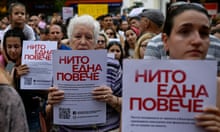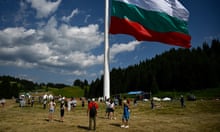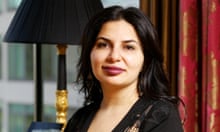Music will play, fireworks will explode and shimmer; then at the stroke of midnight on 1 January, Bulgaria, the poorest and “most corrupt” country in the European Union, will pick up the baton of the bloc’s rotating presidency.
The presidency – chairing EU meetings and setting an agenda – does not have the clout it once did, but it is still a big moment for the eastern Balkan nation of 7.4 million people, which was part of the last wave of EU enlargement that reunited east and west.
Yet more than a decade after Bulgaria joined the EU, questions remain over its record in tackling corruption, while the presence of far-right minority parties in government has caused alarm. According to Transparency International’s corruption perceptions index, Bulgaria is the most corrupt country in the EU.
“No one [in Bulgaria] is prosecuting political corruption, there are no ex-government officials in jail,” says Ognian Shentov, chairman of the Centre for the Study of Democracy in Sofia. “We have reached a stage of state corruption which we describe as state capture.”
A report by his organisation paints a devastating picture of corruption from the top to bottom of society. More than one in five adults, 1.3 million, are thought to have taken part in a corrupt transaction, such as paying or receiving a bribe, but only 72 court cases were completed in 2015.
Anti-corruption campaigners point to the Bulgarian subsidiary of Lukoil, the privately-owned Russian energy company that supplies 100% of Bulgaria’s oil imports. Lukoil is Bulgaria’s largest company and has seen its monopoly power entrenched by successive governments, with laws that discourage competition.
Another red flag includes the delay in investigating the murky tale behind the collapse of the Corporate Commercial Bank, which was the country’s fourth largest lender until a 2014 bank run, which appears to have been set off by a feud between its wealthy owner and a politician.
More than a decade after joining the EU on 1 January 2007, Bulgaria and Romania remain subject to special monitoring to bring them into line with European norms.
The cooperation and verification mechanism (CVM), designed and run by Brussels, was only meant to last a few years. Eleven years later, the European commission continues to publish annual reports, but anti-corruption specialists worry the heat has gone.
“Clearly the mechanism has produced results. Bulgaria managed to bring under control organised crime,” says Ruslan Stefanov, who leads CSD’s corruption monitoring programme. “But on corruption and judicial reform, it is not producing the results the EU and Brussels had expected.”

He argues, however, it is wrong to conclude Bulgaria is “the most corrupt country in the EU”, pointing to other surveys that give a more mixed picture than Transparency International. “[The TI survey] is a question of whether you like your country or not. I don’t think Bulgaria is experiencing more corruption than, say, Slovakia, but the potential impact is much bigger because the economy in Bulgaria is much smaller.”
Yet Stefanov worries Brussels might be going soft on Bulgaria because it does not want to “thrash a country” that is about to take the presidency.
A senior official at the European commission, who was not authorised to give their name, rejected suggestions the reports could be scrapped for political reasons. The CVM process would not be concluded until “we will see all benchmarks and all recommendations in the reports fulfilled”.
The presidency is far from the only reason why the EU may be less inclined to get tough with Sofia. Solvent and stable Bulgaria is not “a problem country” for Brussels. Bulgaria is not facing sanctions for the violation of the rule of law, like Poland, nor has it picked a fight with Brussels on refugee quotas, like Hungary. Neither has it required three multibillion-euro bailouts, like Greece.
Sofia’s solid finances and predictability under the centre-right prime minister, Boyko Borissov, explain why Jean-Claude Juncker, the European commission president, wants Bulgaria in the eurozone and has called for it and Romania to “immediately” join the passport-free Schengen zone. France, Germany and other western countries have blocked the Schengen entry of the two eastern states for years over corruption concerns.
Heather Grabbe, director of the Open Society European Policy Institute, detects a shift in attitudes since Brexit and the standoff over the rule of law in Poland. “In 2007 willingness to join everything was just assumed and ability was the big problem; but now the fact Bulgaria is trying and wanting to be part of things seems to count more.”
It is a view echoed by a Bulgarian source who knows Borissov and his inner circle. “There was a time in small countries when the fear of Brussels was very strong. But now if you have fiscal stability and you are cooperating in big decisions, then you are not going to face a problem.”

The biggest controversy of Bulgaria’s time in the European spotlight seems more likely to centre on those ministers who are part of the xenophobic United Patriots coalition. In October the deputy prime minister, Valeri Simeonov, was found guilty of discrimination for a 2014 speech in parliament where he described Romany people as “arrogant, presumptuous and ferocious-like humans” and compared Romany women to “street dogs”.
The defence minister, Krasimir Karakachanov, has called for Europe’s external borders to be defended by “force of arms if necessary” to stop asylum seekers. His party, the Bulgarian National Movement, is “notorious for systematically propagating hatred against neighbouring peoples in the Balkans as well as anti-Gypsy propaganda”, according to a Council of Europe report.
The source who knows Borissov claimed these ministers were not influential but their views have rung alarm bells in Brussels. The European commissioner for justice, Věra Jourová, told Politico earlier this year she was “nervous” about the situation and was monitoring the government’s policy on the Roma.
This article was amended on 4 January 2018. Lukoil is not Kremlin-owned, it is privately owned.









